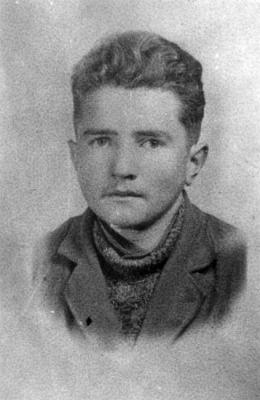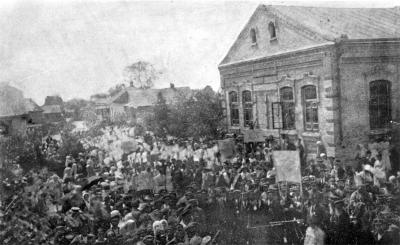“You can take my body, but not my soul”
Mefodiy Logatzky, his wife, Kseniya Logatzkaya, and their children Darya and Fyodor lived on a khutor (small isolated farm) near the village of Długowola, close to Wlodzimierzec, in Vohlynia. Before the war, Logatzky had worked for a wealthy Jew in the nearby town of Wlodzimierzec and, through him, had met many local Jewish residents.
On June 30, 1941, the German army entered the area, and in April 1942 a ghetto was established in Wlodzimierzec, that existed until August 28 of that year. Just before the ghetto was liquidated, Logatzky warned his Jewish friends of the imminent danger and offered them shelter in his home. Some were suspicious and did not trust him, but others, among them Abraham and Reuven Susel and two young women (originally from Długowola), did go into hiding in Logatzky’s home just before the liquidation of the ghetto took place.
In late 1942, Shlomo Appelboim and his son Sender knocked on the Logatzkys’ door. Logatzky and his wife warmly welcomed them at their home. As devout Baptists, they believed in the Old Testament and that the Jews are the Chosen People. They therefore felt it was their duty and thanked God for allowing them the opportunity to save these Jews. Logatzky not only cared for their needs, but also encouraged the Jews hidden in his home and told them that they would eventually reach the Holy Land.
In spring 1943, Appelboim and his son decided to head for the forest and try to join the partisans. Their decision was reinforced by the intensification of house searches for Jews being carried out in the area. The Susels and the two young women also decided to leave the Logatzkys’ home. Two other Jews from Wlodzimierzec, Lyova and Srulik, who had also fled to Logatzky’s home, decided to stay there. A short time after the others had left, German soldiers conducted a search of the property and found the hiding Jews. The two were murdered on the spot and Logatzky was taken away to be interrogated. When asked if he knew that the punishment for helping Jews was death, he replied: “You can take my body, but not my soul.” The Germans executed Logatzky, burned down his house, and stole his livestock. His wife Kseniya, 13-year-old daughter Dariya, and young son Fyodor were left homeless and, until the liberation on January 12, 1944, they themselves had to go into hiding. Sender Appelboim survived the war with the partisans and later moved to Israel. He maintained contact with the Logatzky family and in 1989 applied to Yad Vashem to have them recognized as Righteous Among the Nations .
On June 20, 1990, Yad Vashem recognized Mefodiy and Kseniya Logatzky, and their daughter, Darya Logatskaya, as Righteous Among the Nations.








